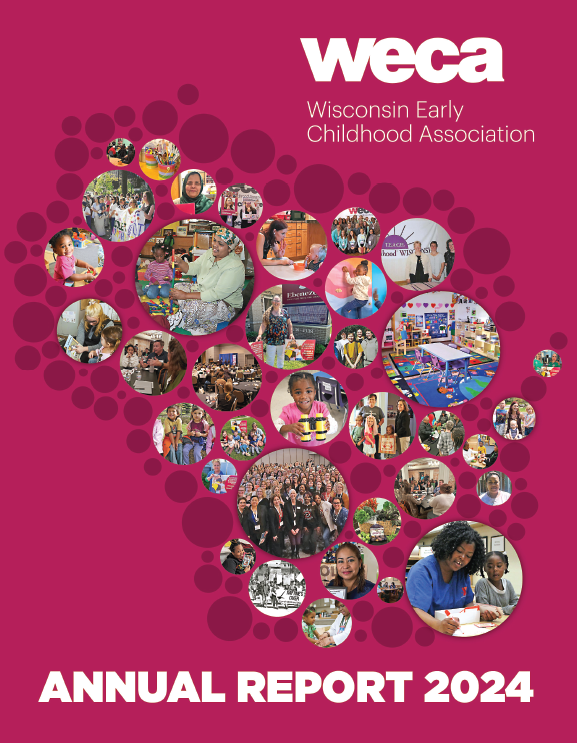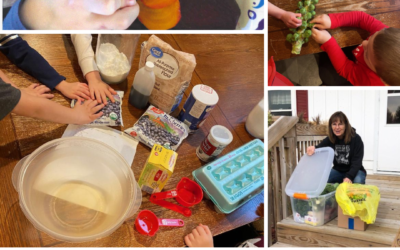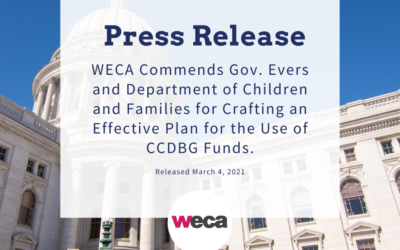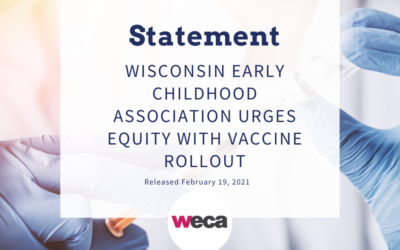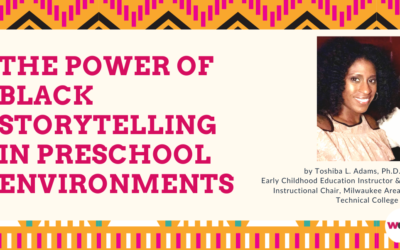Impact & Influence
WECA centers innovation in all its work to support the early childhood workforce and early care and education in Wisconsin. Check out this page for more information on WECA’s innovation and influence through several impact updates, our blog, Annual Reports, news coverage, and more.
WECA In The Spotlight
Survey: Only half of Wisconsin’s child care slots are affordable for Families (Wisconsin Public Radio)
Families are ‘drowning’ as early child care programs face widespread staffing shortages (Wisconsin Public Radio)
Jackson County sees success with efforts to combat child care crisis (Wisconsin Rapids Tribune)
Advocacy group shines spotlight on child care need, potential solutions (Wisconsin Examiner)
Early Childhood Education News
The death of a day care: When a child care center closes, an entire community is affected (The 19th News)
Child care industry struggles with shortage of workers (ABC News)
Why You Can’t Find Child Care: 100,000 Workers Are Missing (The New York Times)
Rural communities need federal child care investments (Center for American Progress)
WHAT IS WECA?
WECA is a state nonprofit with significant local reach that supports early care and education in Wisconsin. Watch this video to get perspective from providers, partners, advocates, and WECA staff.
Read the Annual Report!
For more information about WECA’s research and data findings – visit this page.
Good Food at Home Partnership
WECA’s food systems staff collaborated with Partnership for a Healthier America to help bring fresh fruits and vegetables to 200 Milwaukee families this past winter. The initiative provided $60 a month in Instacart credits for fresh produce.
“Providing access to these fresh foods can help improve outcomes for children for a lifetime,” shared WECA food systems co-coordinator Catherine Hansen.
Learn more about the project in this video overview (offered in English) and read our recent blog for more on WECA’s commitment to assisting early childhood programs foster positive food environments to help children and families thrive.
Wisconsin Early Childhood Association Blog
A hub of first-hand perspectives, calls to action, program and initiative information and other timely updates.American Rescue Plan: Affordable Health Insurance for the Wisconsin Child Care Workforce
On April 15, Wisconsin received $579.7 million for child care through the American Rescue Plan passed by Congress in March. These funds will be used to help families afford child care and to help stabilize the child care market (i.e. support child care businesses impacted by COVID-19 that are struggling to pay staff and fixed costs, such as rent, mortgage, or other operating expenses).
We Are Teachers Too: Reflections by Kyra Swenson
It began with idle small talk at a friend’s party. But that’s always how it begins.
“I’m a Realtor, what do you do?”
“I’m a teacher.”
“Oh, that’s such a rewarding job! My niece is in second grade. What grade do you teach?”
“I teach one-year-olds.”
*record scratch *
“…wait, I thought you said you were a teacher. What do you teach one-year-olds?”
WEESSN + Parenting Place + Local Farmers = new Farm to ECE purchasing pilot for child care providers
It has been a long-standing dream for Farm to Early Care and Education to explore ways for child care providers to share services in bulk purchasing of food for the children they serve. The year 2020 and a global pandemic magnified the need for fresh, local, and affordable options for meal services. Very early in the pandemic, child care providers struggled to find fresh produce. Many child care sites had to revert back to canned fruits and vegetables, meat, and protein alternatives that were in short supply. Frustrations in limits on items that could be purchased in stores literally had child care providers in tears because it was difficult to buy enough food at one time to keep meals going. It became a crisis, in that child care directors had to figure out new ways to keep little bellies full. Sometimes that meant a meal with no fruits and veggies, heavy on carbohydrates, and low in nutrients.
Press Release: WECA Commends Gov. Evers and Department of Children and Families for Crafting an Effective Plan for the Use of CCDBG Funds.
The Wisconsin Early Childhood Association commends Governor Evers and Department of Children and Families Secretary Amundson on crafting an effective plan for the use of Wisconsin’s additional CCDBG funds through the Consolidated Appropriations Act of 2021. This plan addresses pressing and immediate needs in our early care and education system, while putting in place mechanisms to stabilize this critical sector into the future.
WISCONSIN EARLY CHILDHOOD ASSOCIATION URGES EQUITY WITH VACCINE ROLLOUT
The Wisconsin Early Childhood Association strongly opposes the prioritization of one group of educators over another in County vaccine rollout.
The Power of Black Storytelling in Preschool Environments
As we approached Black History Month, I took a moment to reflect on my early schooling experiences. As a Black child who attended predominantly White k-12 schools, I am unable to recall any school-wide celebrations of Black history. What I do recall is being taught by primarily White female teachers. While I’m certain that their actions were well intended, their teaching practices lacked diversity. From an early age, I was constantly reminded of the perpetuation of white privilege in my educational settings. This notion of privilege was evident through my teacher’s mainstream selection of reading materials, guest speakers, field trips and exploration of historical figures who did not share my racial background. I suffered socially, emotionally, and academically while navigating these early education environments. Reflecting back, I now realize that my developmental needs were not being met, in part, due to the mismatch noted between my racial identity and the school’s curriculum. Where were the images of Black people in my early education setting? What were their stories?

